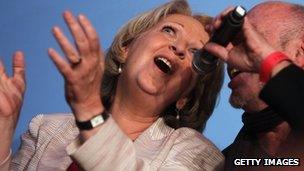State election deals blow to Germany's Merkel
- Published

The SPD's Hannelore Kraft celebrates with supporters
Chancellor Angela Merkel's conservatives have suffered heavy losses in an election in Germany's most populous state.
Support for the Christian Democrats dropped from 35% to 26% in North Rhine-Westphalia, with the Social Democrats set to return to power with the Greens.
It is the Christian Democrats' worst result in the state.
Analysts say many voters rejected Mrs Merkel's tough line on fiscal discipline as a cure for state debt.
Voters in Greece, France and Italy also recently rejected austerity policies.
In another development, Germany's Pirate Party won seats in North Rhine-Westphalia, making it their fourth state parliament.
The Pirate Party has grown in strength recently with its calls for transparency and internet freedom.
Nationally, Sunday's election will not change the balance of power, whatever the outcome, but opposition leaders warn it may send an important signal ahead of national elections expected in late 2013.
Left out
Official results give the Social Democrats (SPD) 39.1%, the Christian Democrats (CDU) 26.3%, the Greens 11.3%, the Free Democrats (FDP) 8.6%, the Pirates 7.8% and the Left, 2.5%, reported AP news agency.
The FDP, the CDU's national coalition partner, performed better than expected, increasing their vote by nearly two percentage points and thereby giving the lie to speculation that they might fail to win seats.
The Left, which won 11 seats at the last election in 2010, failed to pass the 5% threshold and are out of the state parliament.
When the CDU and FDP recently lost elections in the northern state of Schleswig-Holstein, Mrs Merkel's party scored its lowest tally there for 50 years.
North Rhine-Westphalia has a history of influencing national politics.
An early election was called in March after the minority SPD-Green government narrowly failed to get a budget passed.
During the election campaign, state premier and SPD candidate Hannelore Kraft emphasised strengthening indebted local communities, investing in education and boosting the state's business appeal.
Her CDU rival, Norbert Roettgen, who is also Mrs Merkel's environment minister, accused the SPD of financial irresponsibility, and held rallies dominated by a huge inflatable "debt mountain", to emphasise the state's problems.
He provoked controversy early in the campaign by refusing to commit to being a full-time opposition leader if he lost. Such a move would cost him his job in Berlin.
- Published7 May 2012
- Published12 May 2012
- Published8 May 2012